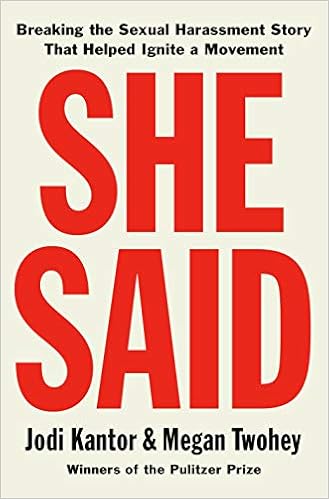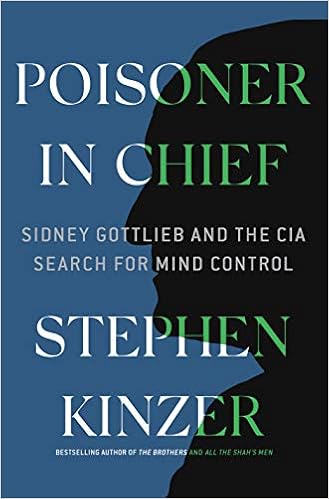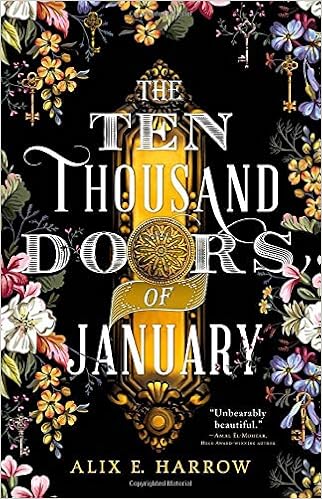Amazon's best books of September: Today's releases
Today's releases include the riveting account of the downfall of Harvey Weinstein, told by the New York Times reporters whose investigation became a catalyst for the #MeToo movement; the bone-chilling story of how Sidney Gottlieb--a club-footed, mild-mannered, peace-loving chemist who lived like a hippie long before the term was coined--became the fulcrum of the United States’ panicked post-WWII bid for supremacy in germ warfare; and a fanciful debut about love and family (and a trusty dog named Bad), and the lengths we'll go to in order to understand the people who make us who we are.
Learn more about these and all of our picks for the Best Books of the Month.
She Said: Breaking the Sexual Harassment Story That Helped Ignite a Movement by Jodi Kantor, Megan Twohey
Rumors had swirled around Harvey Weinstein for decades, and the New York Times’ Jodi Kantor and Megan Twohey were not the only reporters to put their noses to this ugly trail. But as they spoke to actresses and, in a surprising turn, more and more female former employees of the Weinstein Company, they discovered that settlements and nondisclosure agreements had smothered the truth. The steps taken by others to conceal Weinstein’s actions and give them legal cover are almost as chilling as Weinstein’s abuse, and Kantor and Twohey’s unwinding of this camouflage is a delicate maneuver made possible only by women willing to break their silence. The reporters’ urging of an actress to go on the record about Weinstein’s abuse and a last-minute face off with Weinstein and his lawyers in the Times’ offices brings the investigation to its pinnacle of tension. As the book switches to another high-profile accusation, the pacing grows clunky, likely because the authors were not embedded in that investigation, but then rises again, buoyed by a small gathering of very different women at Gwyneth Paltrow’s house. Their candid talk on the lingering toxicity of abuse, social media backlash, and the damage to these women’s careers caused by both silence and speaking out will bring home to readers how one abusive moment can ruin lives, and how listening to what “she said” is the first and important step to stopping someone from perpetrating crime after crime. --Adrian Liang
Poisoner in Chief: Sidney Gottlieb and the CIA Search for Mind Control by Stephen Kinzer
Mention “mind control” and you’re bound to elicit visions of Rasputin, Svengali, or Mesmer, famous creeps said to hold almost preternatural powers of persuasion over less disciplined minds. But interest in deep, subliminal influence of others goes well beyond the salons and séances of would-be mystics. In the 1950s, Sidney Gottlieb was a mild-mannered government chemist who lived in a cabin in the woods of Virginia with his family, pursuing a rustic, spiritual existence without electricity or running water. But he also had a knack for bureaucracy that coexisted alongside patriotic zeal, which led him to the top of PROJECT MK-ULTRA, the CIA’s clandestine pursuit of drugs and techniques intended for mind-control and political assassination. He pioneered “black sites” in Europe and Asia, secret prisons where – with the help of the darkest minds that ran the camps of Nazi Germany and Imperial Japan – he implemented his psyche-busting experiments, including torture and the administration of LSD. Almost unbelievably, MK-ULTRA was only part of his legacy, which includes the development of a 007-worthy poisoned cigar meant for Fidel Castro, and the expansion of his “truth serum” experiments to unwitting American agents (see also: Errol Morris’s documentary, Wormwood). It’s quite the C.V., one which earned him the sobriquets “Black Sorcerer,” “Dirty Trickster,” and now “Poisoner in Chief” –the forthright title of Stephen Kinzer’s mind-blowing biography. As the author of Overthrow and The Brothers, Kinzer is well versed in the investigation of shadowy domestic intelligence services, and Poisoner in Chief similarly draws from the well of posthumously declassified materials and original interviews to craft a meticulous mosaic of a complicated paradox of a man. Spy-lit is a burgeoning subgenre filled with many thrilling and eye-opening books, but Gottlieb’s story is a must-read for any espionage aficionado. —Jon Foro
The Ten Thousand Doors of January by Alix E. Harrow
Often it’s not the ingredients that make the difference in the final product but the storyteller who wields them. Alix E. Harrow’s The Ten Thousand Doors of January includes book ingredients we’ve seen many times before: a girl discovering her true identity, a faithful animal companion, a missing parent, a Very Evil Person, and a book of power. But Harrow takes this basic recipe for a coming-of-age adventure and bakes in an emotional and heroic resonance that thrums deep in the reader’s belly. January Scaller is left with her father’s patron on an expansive Vermont estate, while her father travels the world searching for interesting relics in the early 1900s. One such relic is a book titled The Ten Thousand Doors, which tells of Doors between worlds. January knows the book must be true, because she once saw such a Door. When her father goes missing, January decides to leave her cosseted existence to discover his fate. Rejecting comfort in order to grow into one’s strengths is a theme that echoes throughout the novel. “I didn’t want to be safe, I suppose. I wanted to be dangerous, to find my own power and write it on the world,” one character explains to January. As she travels to new countries through new Doors, January learns how to be audacious, to write her power on the world, and to live the wild, exuberant life that her sheltered upbringing had denied her. Those who keep Philip Pullman’s His Dark Materials trilogy or Katherine Arden’s Winternight novels on their keep shelf might want to add The Ten Thousand Doors of January in its own spot right beside them—a mighty reminder that heroism, done properly, should be dangerous indeed. —Adrian Liang



0 comments:
Post a Comment